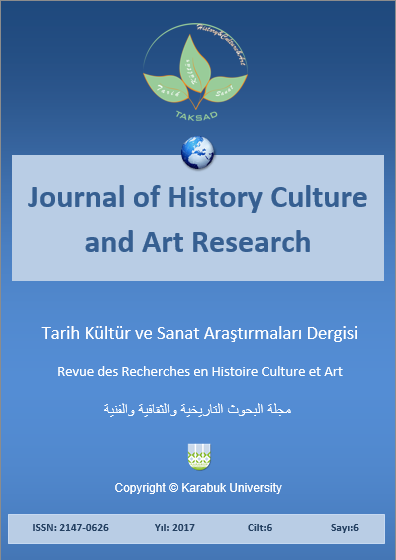Cultural Relations between Germany and Iran and its Impacts on Intellectual Movement in Iran
DOI:
https://doi.org/10.7596/taksad.v6i6.1322Anahtar Kelimeler:
Cultural relations- Germany- Iran- Intellectual movement.Özet
Cultural diplomacy is one of the tools of public diplomacy that governments are trying to attract people from those countries before attracting other governments; among different types of modern diplomacy, including public diplomacy, media diplomacy, and educational diplomacy, cultural diplomacy has a special significance. During the Qajar era, the German government began a consistent and expansive cultural activities in many countries, including Iran, by understanding the international structure affected by the two powers of Russia and the United Kingdom, as well as the proper understanding of the power of cultural diplomacy. In this paper, we try to answer the following questions: Why did the German government, contrary to its rivals in Iran, the British and Russian governments, define their foreign policy on the basis of a cultural approach? How has this cultural relationship affected the Iranian intellectual community? In response to these questions, we can state the following assumptions: “The German government is aware of the fact that in traditional societies such as Iran, cultural diplomacy based on religious feelings and religious intolerance is higher than any political and economic motive, and that this type of diplomacy is not confronted with the opposition of the two powers of Russia and Britain”. “Iranian-German cultural associations have been influential both on Iranian intellectual activists and those acting with religious backgrounds and those with stronger nationalist tendencies”.
Referanslar
Ahrar, Ahmad (1973). Storm in Iran. Tehran: Bina.
Ariyan Poor, Yahya (2000). From Saba to Nima, 150 years history of Persian literature.
Azizi, Mohammad (2006). The state association of Azerbaijan in the Mashrute period. Tabriz: Akhtar press.
Behnam, Jamshid (2008). The Berlins. Iranian thinkers in Berlin, 1915-1930. Tehran: Farzan press.
Gerantuski, E. A. & Dandamayf, M. A. (2006). The history of Iran from ancient time until today, translated by Keikhosraw Keshavarzi. Morvarid.
Kahal Zadeh, Mirza Abolghasem (1989). The seen and hearings, by struggling Morteza Kamran. Culture press.
Kavusi Araghi, Mohammad & Salehi, Nasrolah (1996). The office of political studies and international of foreign ministers. Tehran
Kazemzadeh, Iranshahr (1984). The works and circumstances of Kazem zadeh Iranshahr. Tehran: Eghbal.
Liten, Wilhelm (1989). The Liten’s memories, translated by Parviz Sadri. Tehran: Iranshahr press.
Mack Beride, Shen (1996). One world, several voices, translated by Iraj Pad. Tehran: Sorrosh.
Marashi, Afshin (2008). Nationalizing Iran: Culture, Power, and the State, 1870-1940. University of Washington Press.
Mostofi, Abdolah (1982). The biography of my life or social and administrative history of the Qajar period.
Nider Mayer, Eskarfen (1984). In the burning sun of Iran, translated by Keikavus Jahandari. Tehran: The history of Iran press.
Sadr Hashemi, Mohammad (1985). The history of journals and magazines of Iran. Esfahan: Kamal press.
Safaee, Ebrahim (1989). The Mashrute leaders. Tehran: Javidan Press.
Safiri, Florida (1985). The police in southern Iran, S.P.R., translated by Mansure Etehadie. Tehran: Persian literature press.
Samavar, Lari; Purter, Richard E. & Lizara, Estefani (2000). The relation between cultures, translated by Gholam Reza Kiyani & Seyed Akbar Mir Hassani. Tehran: Baz publication.
Sayks, Sar Persi (2001). The history of Iran, translated by Seyed Mohammad Taghi Fakhr Daee Gilani. Tehran: Afson.
Sepehr, Ahmad Ali (Movarekholdole) (1995). Iran in the big war (1914-1918). Tehran: Namak press.
Stunz, Rab (2004). Great thinkers of sociology, translated by Mehrdad Mir Damadi. Tehran: Center.
Taghizadeh, Hassan (1993). Stormy living. Tehran: Scientific press.
İndir
Yayınlanmış
Nasıl Atıf Yapılır
Sayı
Bölüm
Lisans
Tarih Kültür ve Sanat Araştırmaları Dergisi'nde yayımlanan tüm çalışmalar Creative Commons 4.0 CC-BY lisansı ile lisanslanmıştır.
Bunları yapmakta özgürsünüz:
- Bu eseri her boyut ve formatta paylaşabilir — kopyalayabilir ve çoğaltabilirsiniz.
- Materyalden Adapte et — karıştır, aktar ve eserin üzerine inşa et
- her türlü amaç için, ticari amaç da dahil
Alttaki şartlar altında:
Atıf — uygun bilgiyi, lisansa linki, and ve değişiklik yapıldıysa değişiklik bilgisinivermelisiniz. Sizi veya kullanımınızı lisansörün onayladığı bilgisini içermemek kaydıyla, size uygun şekilde bu işlemleri gerçekleştirebilirsiniz.
AynıLisanslaPaylaş — Eğer materyali karıştırdınızsa, aktardınızsa ya da materyalin üzerine çalıştınızsa, ancak aynı lisans ile dağıtabilirsiniz.
- Ek sınırlamalar yoktur — Lisansın izin verdiği hakları başkaları üzerinde kanunlarla ya da teknolojiyikullanarak sınırlayamazsınız.







